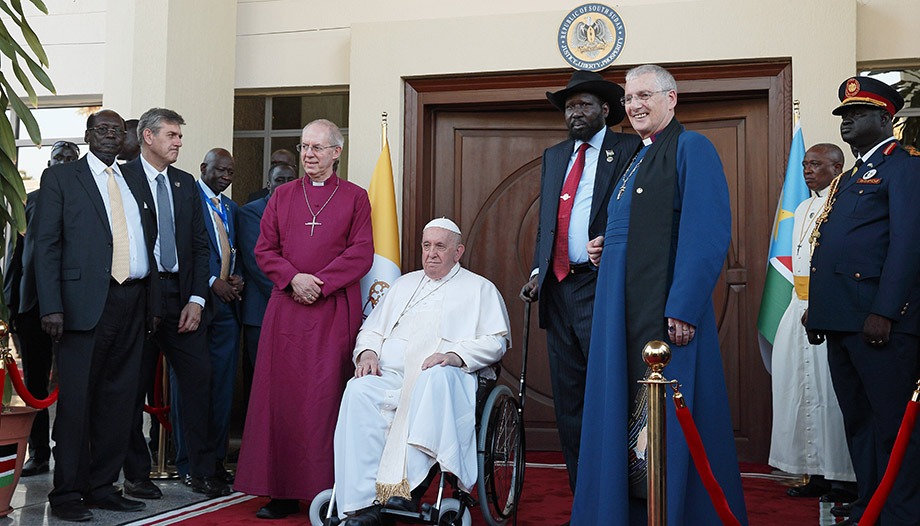In the early afternoon, after a flight of more than three hours from Kinshasa, an official reception was held at the airport of Juba, capital of South Sudan, for Pope Francis, who will visit the President of the Republic, Salva Kiir, and the Vice-Presidents. He will then meet with the authorities, civil society and the diplomatic corps.
Tomorrow, the Pontiff will hold a meeting with priests, consecrated men and women and seminarians at the Cathedral of St. Teresa, and in the afternoon an ecumenical prayer service will be held at the John Garang Mausoleum. On Sunday there will be Holy Mass at the same mausoleum, after which the Holy Father will proceed to the airport in Yuba to return to Rome.
For years, Pope Francis, together with the Archbishop of Canterbury, Justin Welbyand the moderator of the Church of Scotland, the Presbyterian Reverend Dr. Iain Greenshields, have together pushed for the peace process in South Sudan to end the civil war following the 2013 coup d'état.
The Archbishop of Canterbury, Justin Welby, will be accompanied in South Sudan by his wife, Caroline Welby who has visited South Sudan on several occasions, to support the women of the Church in their role as "peacemakers".
More than 400,000 dead
In a meeting with Vatican journalists,Father Alfred Mahmoud Ambaroa South Sudanese priest of the Diocese of Tombura-Yambio and pastor of Mary Help of Christians in the city of Tombura, recalled "the drama of the war and the consequent humanitarian emergency in South Sudan, so much so that it led the Pope to summon the highest South Sudanese religious and political authorities, together with the Archbishop of Canterbury, to Casa Santa Marta in April 2018 for an ecumenical spiritual retreat."
President Salva Kiir and the vice-presidents-designate, including Rebecca Nyandeng De Mabior, widow of South Sudanese leader John Garang, and Riek Machar, leader of the opposition, went to the Vatican, as reported by Omnes. "Those days were crowned by the Pope's unprecedented and shocking gesture of getting down on his knees," Father Alfred continued, at the end of a speech in which he implored the gift of peace for a country disfigured by more than 400,000 dead, and then kissed the feet of South Sudan's leaders. "May the fire of war be extinguished once and for all," the Pontiff said, reiterating once again his desire to visit the country.
"Stalled peace process"
South Sudan is much smaller than the Republic of Congo, but slightly larger than Spain. It has 644,000 square kilometers and about 1.7 million inhabitants. It gained independence from Sudan in 2011, after decades of war. While Sudan is Arab and Muslim (90 %), the population of South Sudan is black and mostly Christian, and more than half are Catholic (52 %). Nine percent are other Christians; Muslims, 6 %; and other faiths, 32 %.
As reported by Pontifical Mission Societies Roy Zuniga, a Comboni missionary, who with ten parishioners from his parish will travel six hours through dangerous areas to meet with the Pope. Fr. Zuñiga, who knows the situation in the country well, hopes that the Pope's visit will give a boost to the peace process, "we hope for a miracle", he said. In his opinion, "we hope that he will undo the knot, we are stuck with the peace process".
Of the 13.7 million inhabitants, around 7.2 million, more than half, are Catholic, there are 7 ecclesiastical circumscriptions, and 300 priests, 185 diocesan and 115 religious, reports the Holy See on South Sudan.
With the Bishops of the DR Congo
What did the Pope say in his last meeting in the Democratic Republic of Congo? After meeting with priests, religious men and women, and seminarians, in a meeting Particularly moving, and far from the crowds of the past days at the airport of Ndolo and the young people, the Holy Father asked the bishops of the Congolese nation, at the headquarters of the Episcopal Conference, to dedicate time to prayer, to be close to God, to the Eucharist.
"Let us take care of our closeness to the Lord so as to be his credible witnesses and spokespersons of his love to the people," he encouraged them. "Let it not happen that we think we are self-sufficient, much less that the episcopate is seen as the possibility of climbing the social ladder and exercising power. And, above all, let not the spirit of worldliness enter, which makes us interpret the ministry according to criteria of personal benefit".
"First of all," he stressed, "I would like to invite you to allow yourselves to be embraced and consoled by the closeness of God. For us, who have received the call to be shepherds of the People of God, it is important to be grounded in this closeness to the Lord, to 'structure ourselves in prayer', to spend hours before Him. Only in this way will the people entrusted to us draw close to the Good Shepherd, and only in this way will we truly become shepherds, for without him we can do nothing (cf. Jn 15:5).
Next June you will celebrate the National Eucharistic Congress in Lubumbashi, the Holy Father reminded you in his last message: "Jesus is truly present and active in the Eucharist; there he gives peace and restores, consoles and unites, enlightens and transforms; there he inspires, sustains and makes his ministry effective. May the presence of Jesus, gentle and humble of heart, conqueror of evil and death, transform this great country and always be your joy and your hope. I bless you from my heart. And please continue to pray for me".









